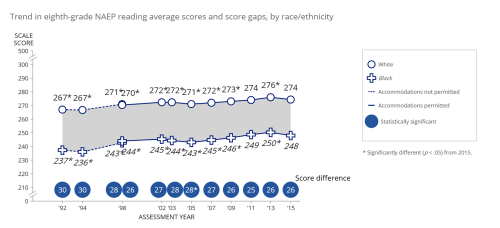The Editorial Board of The New York Times is a reliable source of pro-education reform articles, and yesterday they published their take on the potential new testing environment that will be ushered in if the “Every Student Succeeds Act” (ESSA) is passed and signed into law. The Board was relieved that earlier drafts which “seemed poised to weaken…its protections for impoverished children” were changed in the final legislation and urged its passage by the Senate. What “protections” for our most vulnerable children were at stake?
Annual standardized testing of all children.

The Board acknowledged flaws with how No Child Left Behind labeled and sanctioned schools, noting that testing well beyond federally required exams proliferated as states and school districts administered diagnostic and practice exams lest they fail to prepare students for the examination with potentially dire consequences. They also correctly noted that the backlash against testing is justified – even if they only tangentially admit the central role of federal policy across two administrations in getting us to this point. However, they also celebrated the preservation of annual standardized testing of all students in grades 3 through 8 and once in high school, and they approved of maintaining the requirement that schools must test 95% of all students and called it a discouragement to the opt-out movement.
The Editorial Board treads familiar, almost entirely mythological, ground with their defense of annual testing of all students: Once upon a time, the federal government “kept doling out education money to the states no matter how abysmally their school systems performed,” and the requirement for mass standardized testing was “to make sure that students in all districts were making progress and that poor and minority students were being educated.” This mythology is summarized by the Board’s concern that previous ESSA drafts “would have allowed state to end annual testing altogether, which would leave the country no way of knowing whether students are learning anything or not.” (emphasis added)

This is, as usual, a staggering lack of imagination, and an insistence upon maintaining annual tests because of properties they do not possess. Only testing every child in every grade level lets us know if children are learning. Only testing every child in every grade allows us to hold districts and schools and teachers accountable. If we do not test every child in every grade, then historically disadvantaged populations will be allowed to sink even further and the promise of equal opportunity will be lost.
Such statements might have been viable in 2001 when the NCLB legislation was passed with bipartisan support, but after nearly a decade and a half, there is no evidence to be found that test based accountability is telling us anything we did not already know from other means, nor is there evidence that the children whose plights provided NCLB’s rationale are prospering. To be honest, at this point in our policy cycle, it takes a love of annual standardized testing similar to Smeagol’s love of the One Ring to be blinded as to how thoroughly it has failed to improve our schools. Consider the latest round of data from the National Assessment of Education Progress. NAEP, dubbed “The Nation’s Report Card,” is a set of standardized tests given to a representative sample of students in 4th grade, 8th grade, and high school from all states every other year, and it is the only consistent measurement of student knowledge across 4 decades of administration. The 2015 results were released this Fall, and they do not speak well of test-based accountability and its impact on the “achievement gap” between majority and minority children:

If we mark the NLCB era from the 2002 test administration, then we have to conclude that, in the 8th grade reading NAEP, the gap in scores between white and black students has closed a grand total of one point. The 4th grade gap has closed a more generous four points in the same time. In mathematics, the NCLB era has seen a score gap in both 4th and 8th grade close all of three points.
One might suppose, given the enormous importance of annual testing of all students imagined by The Times and other testing advocates, that we must surely see far worse in data from previous eras, and to be certain, the period from the late 1980s until the mid-1990s saw distressing increases in test measured gaps before they stabilized prior to NCLB. However, before the late 1980s, there was another picture altogether:


In both reading and mathematics for 8th graders, 1973 through 1988 saw sharp decreases in the measured achievement gaps, closing by 21 and 22 points respectively. While no single factor can wholly account for this, it is hardly surprising that the substantial progress towards educational equality began to erode as our nation abandoned policies of active integration and fair housing during the Reagan administration and as courts with larger conservative majorities released school districts from oversight with integration in mind. The reality is that integration is a key improvement strategy for our nation’s most at risk students, and national policy has largely abandoned it in favor of first the standards based accountability policies of the late 1980s and the 1990s and then the test and punish policies of the NCLB era. With soaring inequality impacting the majority of Americans and our communities and with our collective abandonment of integrated, mixed-income housing contributing to the highest levels of income segregation in the post-War period, why do we need to test every child in every grade in every year to learn that the trends which have negatively impacted almost all Americans and their communities have also impacted our schools?
The Times‘ Editorial Board betrays a staggering lack of imagination when they insist that we must test annually to know “whether students (are) learning anything or not.” Dr. Bruce Baker of Rutgers University argues cogently that if the purpose is to use standardized test data to monitor schools and school systems, you do not need to test every child every year at all; that can be accomplished by testing samples of students every couple of years. Further, if your goal is to know if individual students are progressing in their learning then there are far more important tools that could be used by teachers in formative assessments without any stakes attached that could inform them and parents far more effectively than a mass standardized test whose results come back well into the following school year.
It is also entirely possible to hold schools and teachers accountable without our mass testing ritual and all of the distortions it causes to genuine learning. Grade span testing or semi-annual of student samples would give state and federal officials sufficient data to know when a closer look at a district or school is warranted (although, just like with annual testing, it does not remotely explain what will be found when looking). There are nearly infinite alternative measures of schools such as graduation rates, suspension rates, teacher retention and turnover, teacher qualifications, class sizes, post graduation reports, student engagement, parental engagement, parent satisfaction surveys. Every one of these items – and many others – is a way of understanding what is happening inside of a school, and while ESSA allows states to design accountability systems that use them, the role of testing data will still remain grossly outsized. We also have alternative models of accountability that involve both community stakeholders and teachers themselves such as the local accountability and funding formula efforts in California and peer review systems that already have substantial success where they have been employed. Robust models of teacher accountability exist, and they emphasize the role of teachers as professionals capable of engaging in substantive understanding of their own work and the role of evaluation in supporting teachers as its primary goal.
There is a limited role that standardized test data can play in a comprehensive system of school monitoring, development, and accountability, but it must play a small role at best in coordination with a system that is premised on support and development. However, no school accountability system, regardless of premise, is capable of turning around a 40 year long, society spanning, trend towards inequality and segregation. That requires far more than clinging to annual, mass, standardized testing as our most vital means of giving every child access to an equitable education, and if The Times and other testing advocates really cannot see past that, then they are not merely shortsighted; they are clinging to damaging and delusional policies. A bit like our, poor, deluded Smeagol and his final cry of “Precious!”

The last supporter of annual testing?


Reblogged this on David R. Taylor-Thoughts on Education.
The New York Times takes education reporting as seriously as they cover yak racing.
Reporters on education seem to come from a revolving pool … and I suspect that the scribbler selected for the next foray into an educational issue is actually being punished.
To suggest that this paper does anything beyond Cliff Note research is a torturing of the facts. They’re so consumed with their social justice slop … and the issue of poverty … that they can barely get their fat heads around the fact that these now know-it-alls have actually made education infinitely more difficult for the challenged class. But who cares? It’s the Times and they answer to no one.
Pingback: Daniel Katz: Why The New York Times Editorial Board is Wrong about Testing | Diane Ravitch's blog
Pingback: ‘No Child Left Behind’ Left Behind | NotionsCapital
Pingback: Ed News, Friday, December 11, 2015 Edition | tigersteach